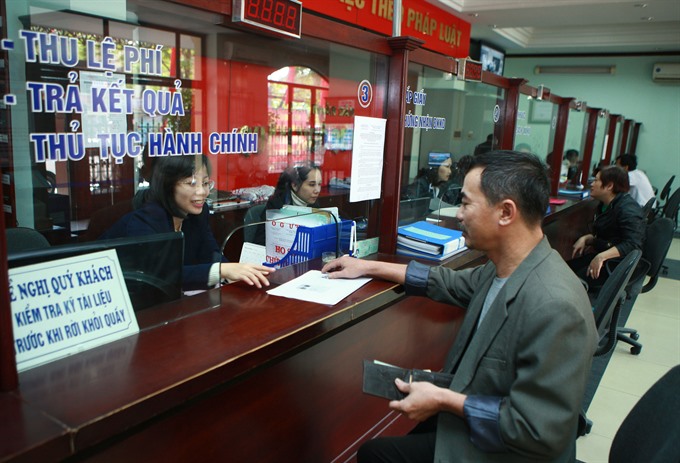 Economy
Economy

Mai Tiến Dũng, Chairman of the Government Office and head of the Prime Minister’s working group, set a June 30 deadline for ministries to finish cutting a substantial amount of cumbersome administrative procedures and business permits that have long obstructed Việt Nam’s business community.
 |
| Administrative procedures at Ngô Quyền District People’s Committee, Hà Nội. — VNA/VNS Photo Lâm Khánh |
HÀ NỘI — Mai Tiến Dũng, Chairman of the Government Office and head of the Prime Minister’s working group, set a June 30 deadline for ministries to finish cutting a substantial amount of cumbersome administrative procedures and business permits that have long obstructed Việt Nam’s business community.
As per the Government’s request, up to 13 ministries must cut the amount of goods subject to specialised instruction under their authority by 50 per cent, as well as halving the number of inspection procedures.
Ministries with the most cuts to the number of goods exempt from official inspection are the Ministry of Health (MoH), Ministry of Agriculture and Rural Development, Ministry of Information and Communications, and Ministry of Transport and Ministry of Industry and Trade (MoIT).
Dũng chaired yesterday’s inspection of 16 ministries regarding their assigned tasks in reforming trade clearance and reduction of unnecessary business permits. Accordingly, representatives from concerned ministries and agencies shared their plans to hit the red tape-cutting targets.
He said that monthly checkups with at least four administrative units from the central to local level are a must. Reports on ministries’ administrative reforms will be submitted to the PM, with the next minister-level inspection starting March 15.
Dũng said the Government will sit with ministries to discuss the June 30 deadline, and will also invite businesses and industry associations to revise legal documents regarding business permits and inspection reductions beforehand.
Đỗ Hoàng Anh Tuấn, Deputy Minister of Finance and member of the PM’s working group, gave the recommendation that information technology should be applied, in order to better manage trade activities and business licenses.
As annual national trade value is now around a staggering US$400 billion, Tuấn suggested moving towards 100 per cent online administration, applying it at 171 national border gates to control civil servants, customs officers and administrators.
Deputy Minister Tuấn also noted that the amount of specialised or lengthy inspections, as compared to normal ones, has decreased from 35 per cent to about 26 per cent in 2017, but is still much higher than developed countries’ average of 7 per cent.
This is something in need of significant improvement in 2018, he added.
Dũng noted that unnecessary business conditions, or business licences, have often been implemented by the wrong authority, causing many unforeseeable difficulties to enterprises.
During yesterday’s discussion on the results of these ministerial reforms, some experts saw progress across different ministries as uneven.
Trần Đình Thiên, director of the Vietnam Institute of Economics, said that the reform momentum has been creating high confidence for businesses, with detailed lists of reduction and policy reforms.
However, he noted that ministries must make ‘real cuts’, reiterating the Prime Minister’s opinion that the gap between words, actions and achievements is not easy to overcome.
Meanwhile, Nguyễn Đình Cung, director of the Central Institute for Economic Management, said that despite receiving the same Government directions, there are ministries with good reform results, like the MoIT or the MoH, while some others have barely laid their reform plans.
He warned that such procrastination will be difficult to overcome, adding that even the fastest ministry took up to five months to implement any decree, while the slowest ones seemed to be completely idle.— VNS









.jpg)